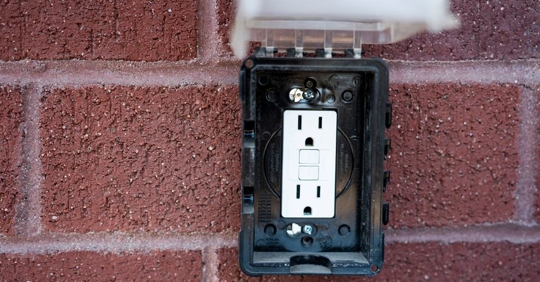Adding an outdoor outlet helps you get power where you need it most. A new outdoor outlet can reduce the need for extension cords, make it easier to access and use power tools, and simplify installing holiday lighting.
The only way to install an outdoor outlet is to drill through a wall in your home. To comply with local building codes, consult a local, licensed electrician.
Benefits of Outdoor Outlets
While most homes come with at least two outdoor outlets—one in the front yard and another in the back—they’re not always in convenient locations for easy access. In some cases, if you have an older home, you may not have any outdoor outlets at all. If you’ve been making do with extension cords, a conveniently placed outdoor outlet will make your life so much easier.
There are several benefits to adding outdoor outlets to your home, including:
- Making yard work easier and safer.
When there’s no outlet available, homeowners will need to run an extension cord for their garage to power any equipment they may need to maintain their yard. Extension cords can also pose a tripping hazard and potentially an electrical fire danger as well. - More convenient entertaining options.
The use of professionally installed outdoor outlets can help make hosting the annual BBQ much easier. Instead of running an extension cord through the yard or window, outdoor outlets will be ready to go. From string lights to a drink fridge, an extra plug could make it much easier to enjoy outdoor get-togethers. - Making holiday light installation safer and easier.
Planning your holiday light displays around the location of your outdoor outlet (or trying to run extension cords from indoor outlets…) can be frustrating. Adding a new outdoor outlet where you know you’ll it will be needed can help you limit the extension cords needed. Plus, using GFCI (ground fault circuit interrupter) outlets outside means you don’t have to worry about overloading your circuit.
Common Features of Outdoor Outlets
There are a few key ways that outdoor outlets are different from indoor electrical outlets:
- GFCI for outdoor outlets is required. The National Electrical Code requires ground-fault circuit interrupters for all outdoor outlets since these outlets are routinely exposed to water and other sources of moisture.
- A weatherproof outdoor electrical outlet cover is also required for any outdoor outlet. This will protect the outlet from damage and reduce the risk of someone accidentally getting a shock from the outlet.
- Outdoor outlets cannot be placed higher than 6 and a half feet above ground level for safety reasons.
Electricians in Montgomery, Alabama
If you’re looking to add a new outlet to the exterior of your home, take the guesswork out of it and give the specialists at AirNow Home Services a call. Our team covers the Montgomery County area and more. We’re here to serve your electrical needs and make projects like these easy. Contact our team at (334) 384-6050.

